GitHub Copilot and ChatGPT are leading AI tools built on OpenAI models, each serving a different purpose. Copilot is tailored for coding, while ChatGPT acts as a multipurpose conversational assistant. Knowing what each excels at can help you choose which tool best fits your needs.
GitHub Copilot: Best for real-time AI-powered software development within integrated development environments (IDEs).
ChatGPT: Best for providing explanations, brainstorming, and general-purpose conversational AI assistance across many knowledge domains, including coding.
Featured Partners: Email Marketing Software
Key takeaways
- ChatGPT supports a wider range of tasks beyond programming, while GitHub Copilot is built specifically to assist with coding inside development environments. (Jump to section)
- There are instances where GitHub Copilot or ChatGPT may not be the ideal fit, depending on your skill level, workflow, or project needs. (Jump to section)
- If your development needs fall outside what Copilot or ChatGPT can offer, alternative AI tools with different strengths and workflows are worth exploring. (Jump to section)
GitHub Copilot vs ChatGPT at a glance
| Attributes | GitHub Copilot | ChatGPT |
| Primary function | Efficient and real-time code completion and suggestion | General purpose conversational AI with coding capabilities |
| Core features | • AI-powered, context-aware code suggestions within IDEs• Supports multiple programming languages | • Versatile conversational AI• Generates and explains code snippets• Excels in natural language processing and a variety of tasks beyond coding |
| Code generation quality | Concise, context-aware, and high quality outputs, but limited error handling and depth | Structured and robust with strong validation, but can be verbose and truncate longer code |
| Code explanation | Limited to suggesting code, not explanations | Excels in explaining complex logic |
| Free tier | Includes 2,000 code completions and 50 chat messages per month | Unlimited free coding usage using GPT-4o and o3-mini models, only downgrading response quality when usage caps are hit |
| Starting price | $10 per month (or $100/year) | $20 per month |
| Visit GitHub Copilot | Visit ChatGPT |
TABLE OF CONTENTS
What is GitHub Copilot?

GitHub Copilot is an AI-powered coding assistant that boosts developer productivity by offering real-time, context-specific code suggestions, generating boilerplate code, and automating routine tasks. It supports a wide range of programming languages and integrates smoothly with popular IDEs, adapting to individual coding styles for improved workflows. By accelerating development speed, refining code quality, and providing intuitive documentation support, GitHub Copilot proves invaluable for developers.
Key features
- Real-time code suggestions: Provides context-aware code completions and predictions as you type, offering entire lines or blocks of code based on the surrounding context to streamline development.
- Natural language processing (NLP): Understands comments and plain language prompts to generate relevant code, allowing developers to describe tasks in natural language for code generation or debugging.
- Multi-language support: Supports dozens of programming languages, including Python, JavaScript, Ruby, and TypeScript, making it versatile for various coding environments.
- IDE integration: Seamlessly integrates with popular IDEs such as Visual Studio Code, JetBrains, and Neovim, allowing developers to work efficiently without switching tools.
Pros
- Provides real-time AI-powered code suggestions directly within IDEs, saving time for experienced developers
- Generates highly relevant code tailored to the immediate context within the development environment
- Delivers automated refactoring capabilities, suggesting improvements to make code cleaner and more maintainable
Cons
- Lacks detailed explanations and comprehensive documentation
- Less helpful for beginners due to limited explanatory outputs
- Primarily focused on coding within IDEs and has no capabilities outside software development tasks
What is ChatGPT?

ChatGPT is a generative AI tool that delivers human-like text responses across a wide range of topics. It can answer questions, summarize information, create content, and engage in clear, context-aware conversations. For developers, it supports tasks like writing code snippets, explaining concepts, and debugging. Its conversational approach and strong grasp of context make it especially effective for answering straightforward coding questions, bringing practical help to both beginners and experienced programmers.
Key features
- Code explanation and documentation: Provides detailed explanations of code snippets, helping users understand how and why certain code works, which is particularly useful for learning and debugging.
- Natural language code generation: Allows users to describe coding tasks in plain language and generates corresponding code, making it accessible for beginners or non-technical users.
- Code refactoring and optimization: Offers suggestions for improving code efficiency, readability, and structure, helping developers refine their codebases.
- Versatile functionality: Beyond coding, ChatGPT can perform tasks such as text summarization, creative writing, research assistance, customer service automation, and generating conversational replies tailored to user needs.
Pros
- Produces detailed, clean, and production-ready code with robust error handling and documentation
- Provides thorough guidance and explanations of concepts, making it ideal for learners and beginners
- Handles tasks beyond coding, such as brainstorming, text generation, and answering questions across various domains
Cons
- Generates verbose explanations and excessive text alongside code, hindering efficiency for experienced developers seeking concise answers
- Sometimes truncates code outputs, especially for longer or complex snippets, requiring users to repeatedly ask for continuation
- Offers limited integration into development environments, making it less convenient for real-time coding assistance
Best for pricing: ChatGPT
ChatGPT wins on pricing thanks to its flexible and inclusive options. It offers a free tier with virtually unlimited coding usage using GPT-4o and o3-mini models, only downgrading response quality when usage caps are hit. Users can also upgrade to the ChatGPT Plus plan for $20 per month to access GPT-4.5, or opt for pay-as-you-go pricing through the OpenAI API — making it suitable for casual users, power users, and developers building custom tools.

GitHub Copilot, while offering transparent and straightforward pricing, is more limited in structure compared to ChatGPT. Its free plan includes 2,000 code completions and 50 chat messages per month. For users requiring more extensive usage, Copilot Pro is available at $10 per month or $100 per year, offering unlimited code completions and additional features.
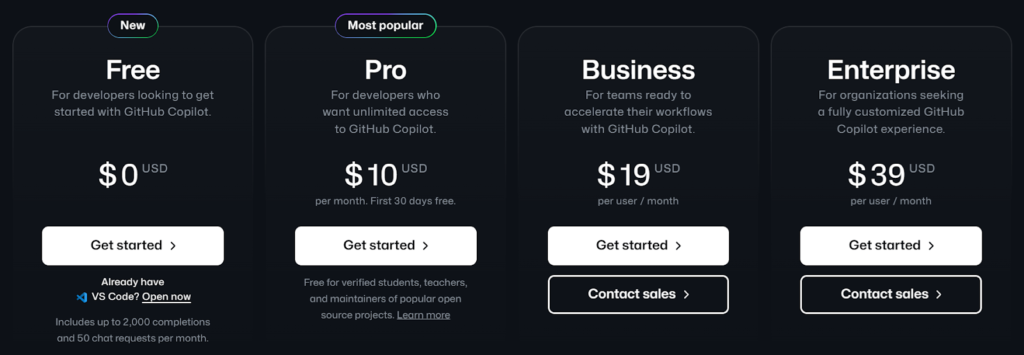
Best for core features: ChatGPT
Surprisingly, ChatGPT outperformed GitHub Copilot in coding tests, despite Copilot’s dedicated focus on coding, ChatGPT excelled in comprehensiveness, presented context-rich explanations, and gave more thorough responses. In addition, ChatGPT not only generates code effectively, but also helps with debugging, explaining concepts, and guiding users through various programming tasks — making it a more well-rounded tool.
For the sake of gauging their coding capabilities and effectiveness, I tested both GitHub Copilot and ChatGPT with prompts related to coding.
Code generation quality
To test code generation, I used the prompt: “Write a Python function called calculate_factorial that takes a non-negative integer as input and returns its factorial. Include error handling for invalid inputs, clear variable names, and comments explaining each step.”
ChatGPT produced a well-structured solution with separate handling for TypeError and ValueError, which improves clarity and simplifies debugging. Its clear comments and organized logic follow best practices, making the output suitable for real-world use. The detailed explanation also makes it easier to understand, especially for collaborative or production-level projects.
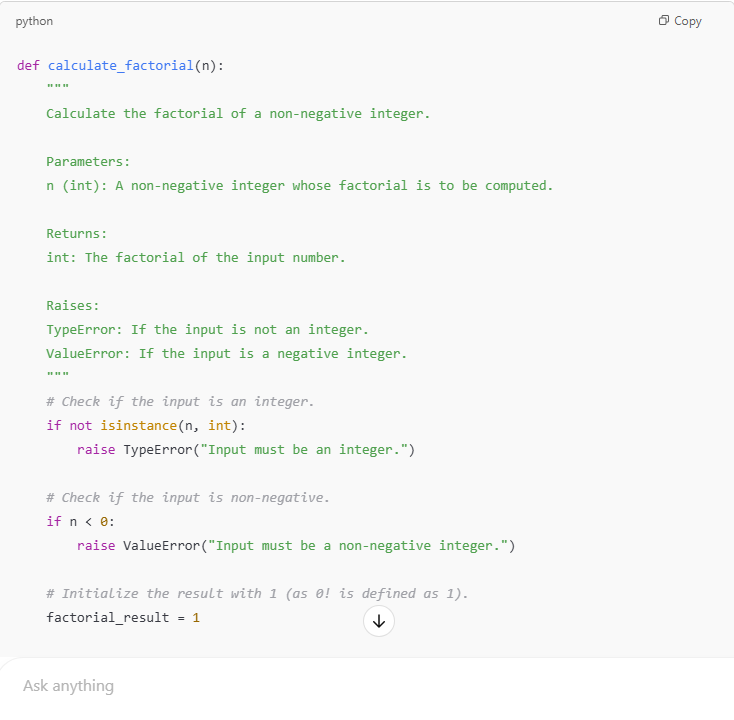
GitHub Copilot took a simpler approach, combining type and value checks into a single condition. This results in shorter code, but might affect the precision that helps with troubleshooting. Its minimal comments and focus on efficiency make it great for quick tasks, though less ideal for complex or production-ready solutions.
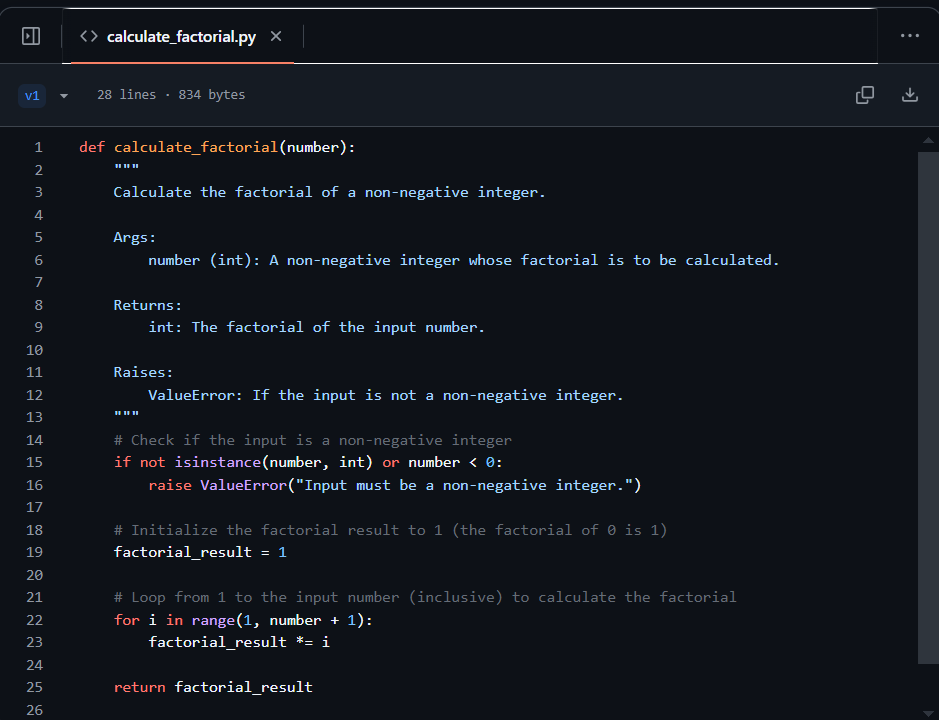
Prompt flexibility
Both ChatGPT and GitHub Copilot perform exceptionally well when it comes to understanding different prompt styles. They can handle natural language, shorthand instructions, inline comments, and full code snippets with ease. While their performance is comparable, the difference lies in how each tool responds to these prompts.
ChatGPT tends to favor detailed, well-documented code with clear structure and step-by-step logic, especially when given complex or ambiguous instructions. It even gave alternative ways to perform the task, and took into account the fact that I’m new to coding.
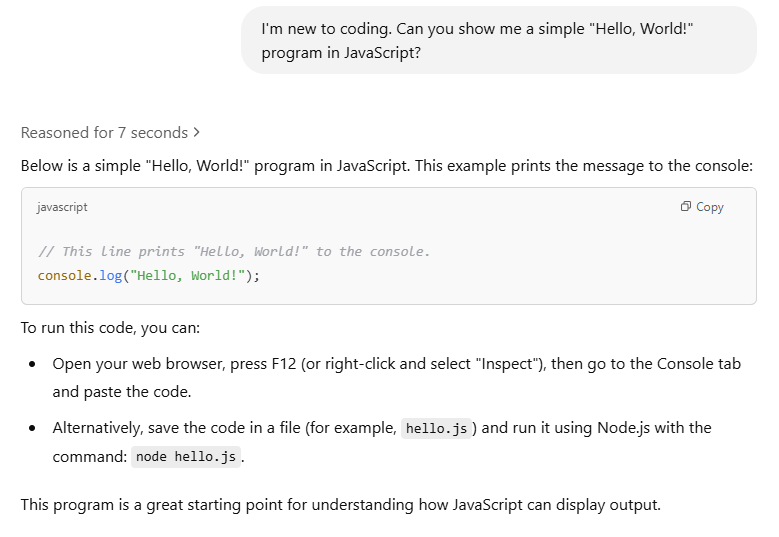
GitHub Copilot, on the other hand, focuses on brevity — generating concise, functional code that gets straight to the point. This makes ChatGPT better suited for learners or in-depth tasks, while Copilot is ideal for quick, efficient code generation.
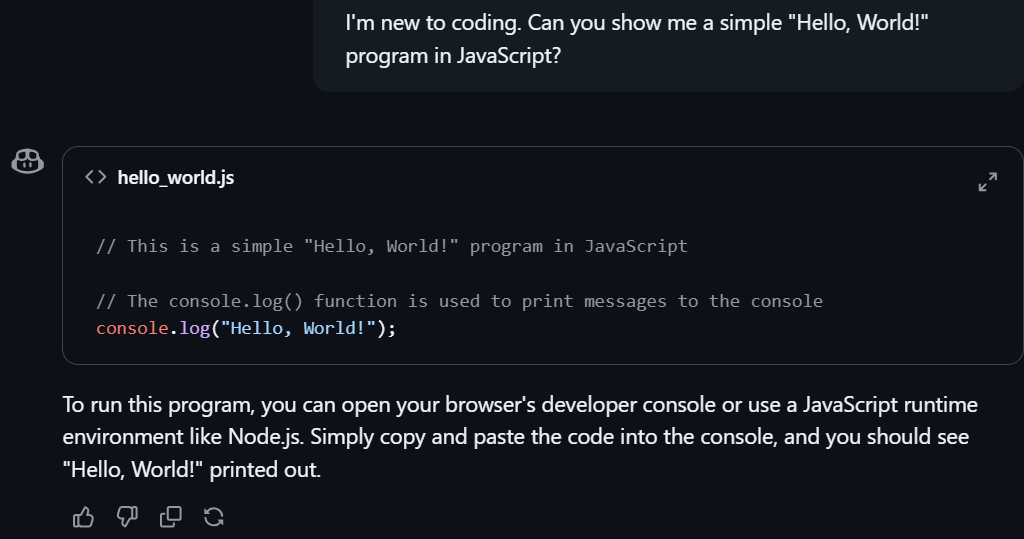
Context awareness
To test how well each tool understands and adapts to existing code, I provided a simple script that sorts a list of numbers and asked for a version that could instead sort a list of tuples by the second value in each. I also requested error handling in case any tuple was missing a second item. This test checked how closely the assistant could follow instructions and apply changes based on a small code snippet.
ChatGPT came out ahead because it handled the task with more care and attention to detail. It checked that every item in the list was actually a tuple and made sure each one had at least two elements before trying to sort. If something was wrong, it gave a clear error message that pointed out exactly where the problem was, making it much easier to fix.
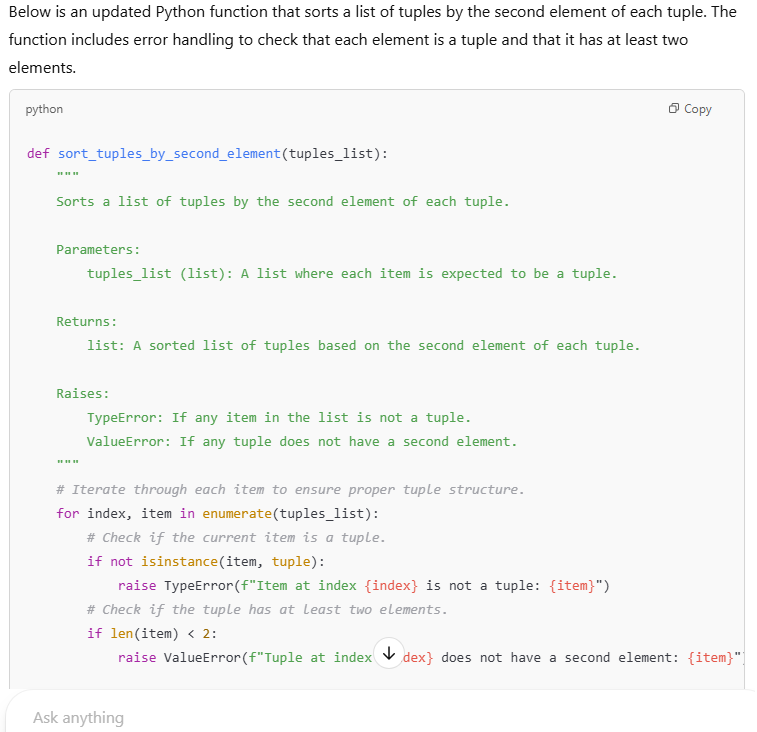
GitHub Copilot gave a working solution, but it didn’t check if the items were tuples — only if they had two elements. If something was wrong, the error message was vague and didn’t say what caused the issue. While the function did sort correctly when the input was clean, it didn’t have the extra checks that make the code more reliable and easier to troubleshoot.
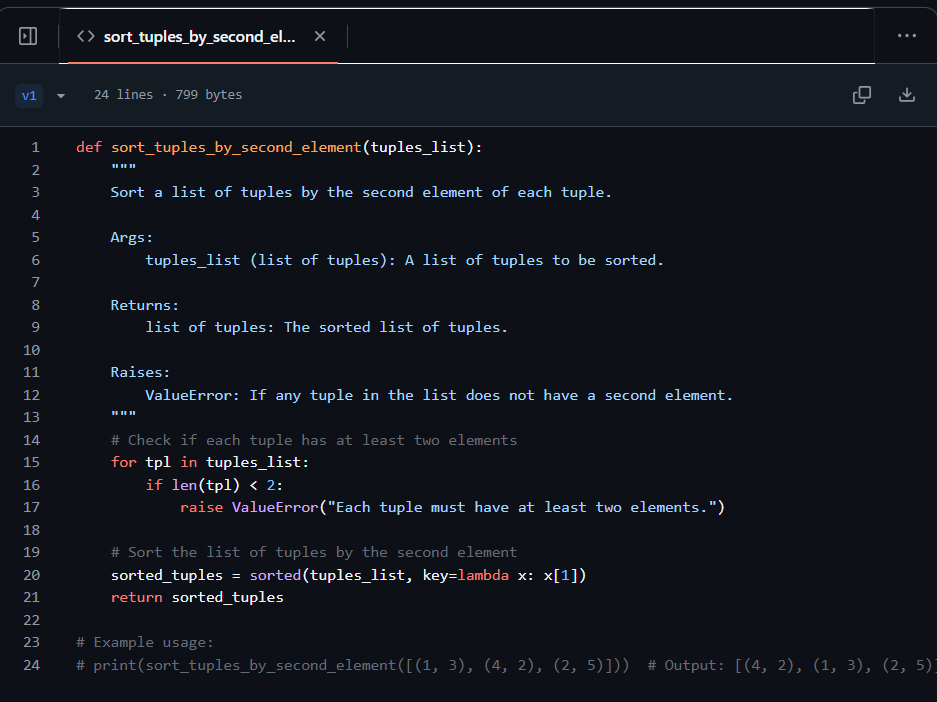
Best for integration: GitHub CoPilot
GitHub Copilot clearly wins when it comes to integration. It offers official support for major IDEs such as Visual Studio Code (VS Code), Visual Studio, and JetBrains, making it easy to use directly in the coding environment developers already rely on. Copilot also integrates with GitHub and even has a command-line interface (CLI) tool, giving it a strong presence across key parts of a developer’s workflow.
ChatGPT, although powerful, falls short in comparison. It can help with coding through third-party plugins for IDEs and can generate useful content for CI/CD, testing, and Git workflows — but none of these are officially integrated. This means it’s more flexible in what it can talk about, but less connected to the actual tools developers use every day.
Best for ease of use: ChatGPT
ChatGPT stands out in this category because it’s ready to use with no setup — just open it in a browser or app. Its simple, natural-language interface lets you describe problems or tasks in plain English and get clear, helpful answers. It’s especially beginner-friendly, offering step-by-step explanations along with code, and its clean layout keeps the focus on the conversation without distractions.
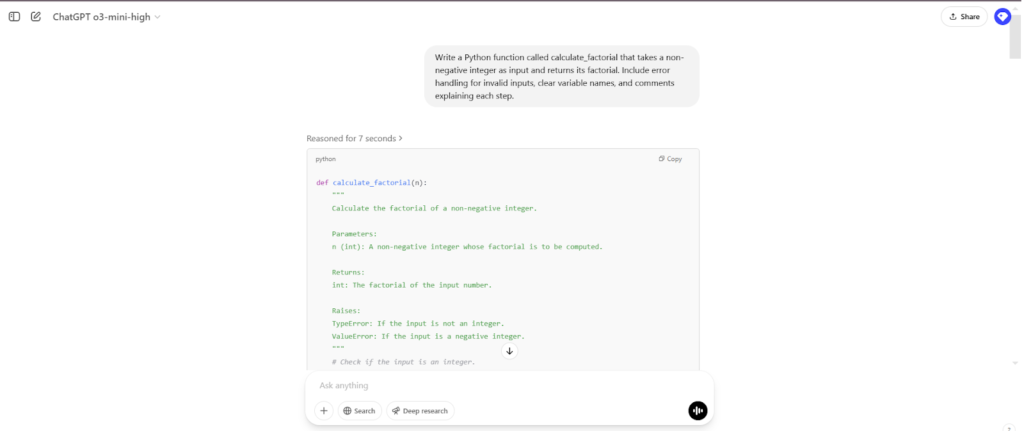
GitHub Copilot is also accessible through the browser via GitHub.com, but its full capabilities are unlocked when integrated into supported IDEs such as VS Code or JetBrains. This setup adds an extra step that may be unfamiliar to beginners. While it has a flexible, comprehensive interface ideal for experienced developers, it can feel complex for new users. Additionally, GitHubCopilot doesn’t provide much explanation alongside its code suggestions, unlike ChatGPT.
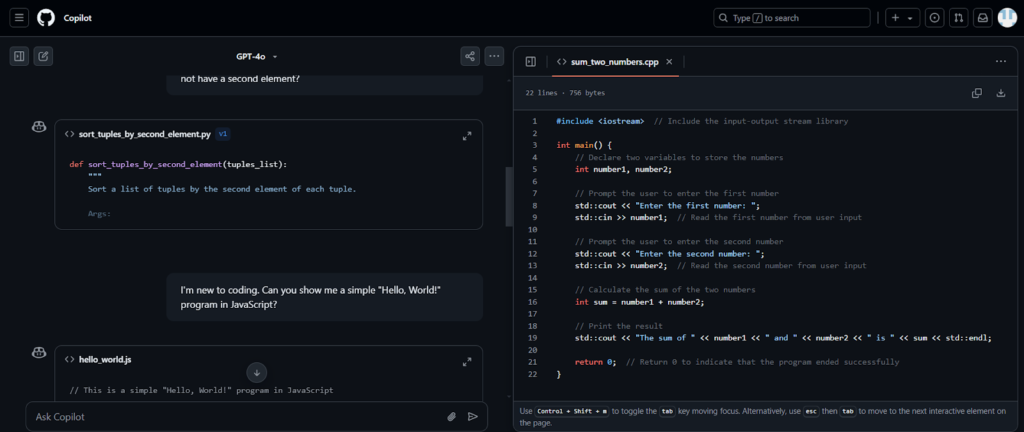
Best for customer support: ChatGPT
ChatGPT takes the lead in customer support because of its multiple support channels. You have access to a help chatbot, extensive documentation, and active community forums. Most importantly, both free and paid users can submit support tickets when they need direct assistance.
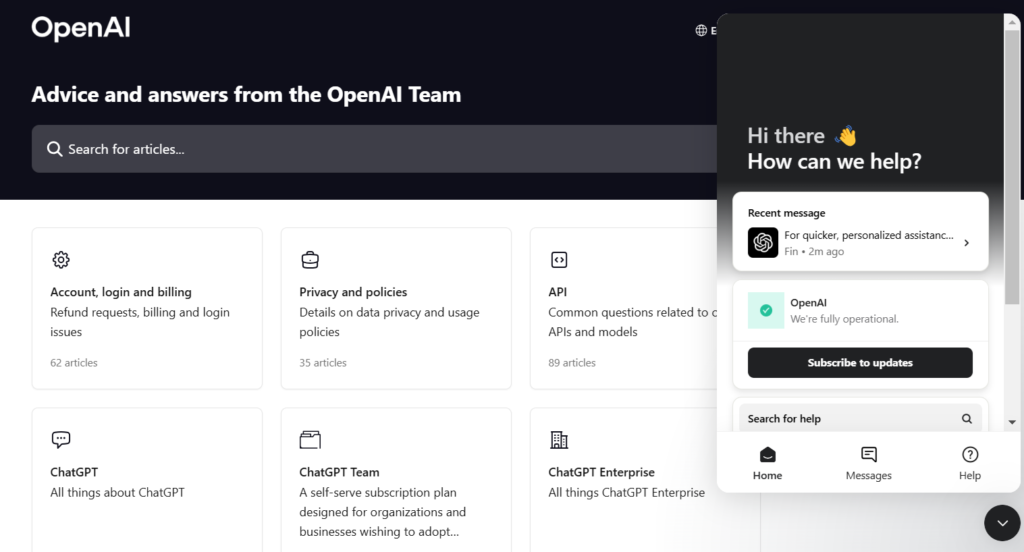
In contrast, GitHub Copilot only provides direct email support to paid users. Free users only have access to self-help options like documentation and community forums, which may not be sufficient for resolving more complex issues.
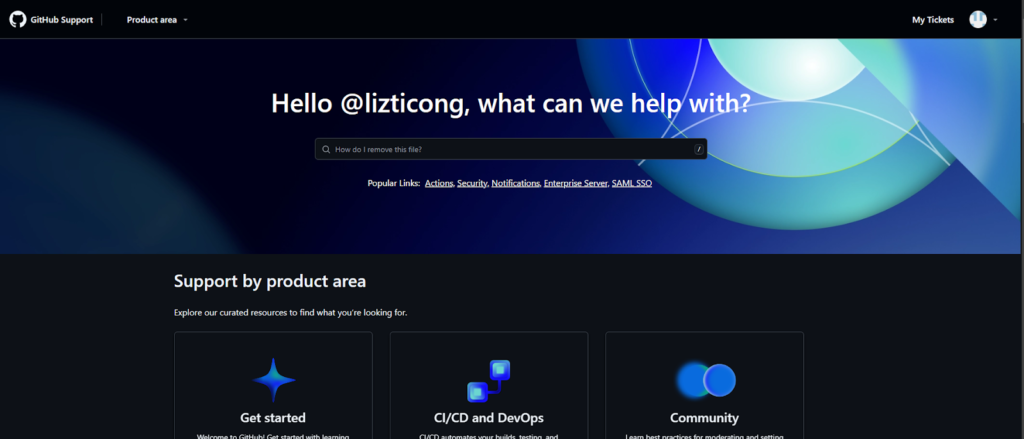
Who shouldn’t use GitHub Copilot or ChatGPT?
Both GitHub Copilot and ChatGPT are robust AI tools, but each has its unique strengths and weaknesses. Depending on your scenario, one might be better suited than the other.
Who shouldn’t use GitHub Copilot?
GitHub Copilot isn’t the best fit for:
- Beginners and new programmers: Copilot assumes a baseline level of coding knowledge and does not explain its suggestions. Without clear guidance or step-by-step support, beginners may struggle to understand the code it generates or learn from it effectively.
- Non-coding or multi-task users: This AI tool is built specifically for in-IDE coding assistance. It doesn’t support broader tasks such as writing, brainstorming, or research, which limits its usefulness for users looking for a multifunctional tool.
- Developers needing detailed explanations: It focuses on real-time code suggestions, not on teaching or documenting them. Users who rely on in-depth explanations or contextual documentation may find its output too brief or lacking in clarity.
Who shouldn’t use ChatGPT?
ChatGPT may not be ideal for:
- Experienced developers focused on speed: Its detailed, often verbose responses can slow down those who prefer fast, minimal code suggestions.
- Users who rely on deeply integrated IDE workflows: While ChatGPT is available as a plugin for many IDEs, developers report that it often lacks full project context or persistent memory, requiring them to manually re-provide information—disrupting flow in complex or multi-file projects.
- Projects with complex code requirements: It may truncate longer code outputs, making it less reliable for generating large or complex functions.
Alternatives to GitHub Copilot or ChatGPT
If neither GitHub Copilot nor ChatGPT suits your needs, you can consider the following AI tools:
Claude AI

Claude AI, developed by Anthropic, is a leading generative AI tool that can write high-quality code, debug, and explain programming concepts across multiple languages. It also performs general-purpose tasks, such as summarization, content creation, and multilingual communication, making it a strong choice for diverse applications. On the downside, according to multiple users, Claude’s performance drops with very long code (over 500 lines), reducing effectiveness on complex projects.
Gemini Code Assist

Gemini Code Assist is an AI-powered coding tool developed by Google, delivering intelligent code suggestions, debugging assistance, and code block generation across more than 20 programming languages. It integrates seamlessly with popular IDEs like Visual Studio Code and JetBrains, adapting to user preferences over time for personalized coding efficiency. However, being a relatively new tool, launched in February 2025, it may still face challenges with refinement and stability compared to more established alternatives.
Tabnine

Tabnine is an AI coding assistant that delivers real-time code completions, trained on open-source code with permissive licenses. It supports more than 600 programming languages and frameworks, integrating directly into IDEs like VS Code, IntelliJ, and WebStorm to enhance development workflows. This AI tool emphasizes speed and privacy, with local and on-prem deployment options for teams with strict data policies. That said, it doesn’t have native support for CLIs, which limits its usefulness for developers who rely heavily on terminal-based workflows.
How I evaluated GitHub Copilot vs ChatGPT
To compare GitHub Copilot and ChatGPT fairly and thoroughly, I looked at five key areas: core features, integrations, pricing, ease of use, and customer support. These categories cover both how the tools perform and how practical they are in real-world use.
- Core features: This is the heart of any AI tool — how well it handles tasks, explanations, and overall usability. For an objective core feature assessment, I focused on how each tool generates code, handles context, and supports a range of technical challenges.
- Integrations: A great tool fits smoothly into your workflow. I looked at how well each AI assistant connects with IDEs, version control systems, and other tools developers rely on daily.
- Pricing: Cost can be a dealbreaker or a selling point. I compared their pricing models to see how flexible and accessible they are for individuals, teams, and different budgets.
- Ease of use: Whether you’re a beginner or a seasoned dev, the tool should be easy to pick up and use. I considered how intuitive each one is, how much setup is required, and how smoothly you can get from prompt to output.
- Customer support: When something breaks — or you just need help — it matters how the company responds. I evaluated the type and quality of support available to both free and paying users.
Bottom line: GitHub Copilot and ChatGPT serve different audiences
In a direct comparison as AI tools, ChatGPT’s multi-purpose capabilities and wider range of use cases give it a clear edge over GitHub Copilot. It goes beyond coding, handling writing, research, and productivity tasks. Copilot, however, remains dedicated to helping developers write code. It thrives in IDEs, offering real-time assistance that streamlines coding tasks without distraction. In short, if you’re looking for an AI that can support you within and beyond programming, ChatGPT is the stronger pick; but if you want a tool dedicated entirely to coding, GitHub Copilot is a smart, specialized choice.
Read our article on the top AI companies to discover the leaders shaping the future of artificial intelligence and how their tools can support your workflow.


